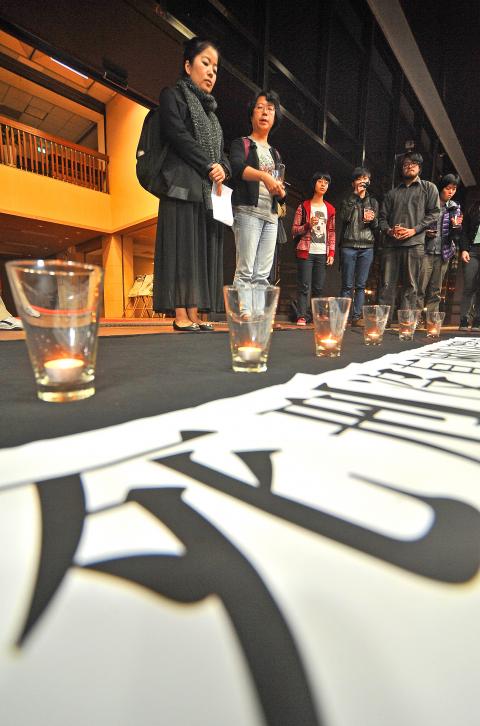Six convicts on death row were executed yesterday, the Ministry of Justice announced last night.
The executions were carried out a day after Minister of Justice Tseng Yung-fu (曾勇夫) signed orders giving the final go-ahead to carry out the death sentences given to the six individuals.
Tseng Si-ru (曾思儒) and Hung Ming-tsung (洪明聰) were executed in Taipei Prison; Chen Chin-huo (陳金火) and Kwang Teh-chiang (廣德強) in Greater Taichung Prison; Huang Hsien-cheng (黃賢正) in Greater Tainan Prison; and Tai Te-ying (戴德穎) in Greater Kaohsiung Prison, Deputy Minister of Justice Chen Shou-huang (陳守煌) told a press conference.

Photo: Liu Hsin-de, Taipei Times
Chen Shou-huang said the six who were executed had murdered women or children using very cruel methods, including setting fire to a home that killed innocent lives.
Chen Chin-huo and Kwang were sentenced to death for killing a female insurance agent and chopping up and eating parts of her body in 2004 in then-Taichung County.
Tseng Si-ru, a former Taipei County senior-high school teacher, was convicted of killing a female colleague after she caught him burgling her home in 2002.
Hung set fire to the home of in-laws, killing his brother-in-law and his brother-in-law’s three children in 2003 in then-Taipei County.
Tai killed his girlfriend’s father by stabbing him 26 times and severely wounded his girlfriend’s mother in 2006 in Kaohsiung.
Huang, who served a prison term for killing his ex-wife, murdered two other men five days after he was released on parole in 2005.
According to the ministry, Chen Chin-huo, Tai and Tseng Si-ru had signed documents donating their organs, but Tai was a hepatitis B carrier and Tseng Si-ru retracted his promise at the last minute. Only Chen Chin-huo’s organs were used.
Tseng Yung-fu, who took office in 2010, resumed capital punishment in Taiwan after a moratorium of more than four years. Since then, the minister has signed nine execution orders, not including the orders for the latest six. With yesterday’s executions, the number of death row inmates now stands at 55, according to the ministry.
Chen Shou-huang said there are still a number of countries that carry out capital punishment, including Japan and most Asian countries.
Various surveys over the years also show support for the death penalty in Taiwan. In a survey by the ministry released in July, 76.7 percent of respondents supported the death penalty.
Late last night, members of the Taiwan Alliance to End the Death Penalty held a demonstration in front of the ministry to protest the executions.
They lit up and placed six candles representing the six prisoners who were executed on a piece of black cloth and waved a white banner that read: “Capital punishment has not achieved the effect of stopping crime.”
Capital punishment is the cheapest method, but also the least effective, in stopping crime, alliance executive director Lin Hsin-yi (林欣怡) said.
If the government really wanted to put a stop to crime, it should not look to capital punishment as the cure; instead, it should strive to quickly and efficiently solve crimes and mete out appropriate punishments, Lin said.
Only then would there be an effective deterrent to crime, Lin said.
Additional reporting by CNA and staff writer

MAKING WAVES: China’s maritime militia could become a nontraditional threat in war, clogging up shipping lanes to prevent US or Japanese intervention, a report said About 1,900 Chinese ships flying flags of convenience and fishing vessels that participated in China’s military exercises around Taiwan last month and in January last year have been listed for monitoring, Coast Guard Administration (CGA) Deputy Director-General Hsieh Ching-chin (謝慶欽) said yesterday. Following amendments to the Commercial Port Act (商港法) and the Law of Ships (船舶法) last month, the CGA can designate possible berthing areas or deny ports of call for vessels suspected of loitering around areas where undersea cables can be accessed, Oceans Affairs Council Minister Kuan Bi-ling (管碧玲) said. The list of suspected ships, originally 300, had risen to about

DAREDEVIL: Honnold said it had always been a dream of his to climb Taipei 101, while a Netflix producer said the skyscraper was ‘a real icon of this country’ US climber Alex Honnold yesterday took on Taiwan’s tallest building, becoming the first person to scale Taipei 101 without a rope, harness or safety net. Hundreds of spectators gathered at the base of the 101-story skyscraper to watch Honnold, 40, embark on his daredevil feat, which was also broadcast live on Netflix. Dressed in a red T-shirt and yellow custom-made climbing shoes, Honnold swiftly moved up the southeast face of the glass and steel building. At one point, he stepped onto a platform midway up to wave down at fans and onlookers who were taking photos. People watching from inside

Japan’s strategic alliance with the US would collapse if Tokyo were to turn away from a conflict in Taiwan, Japanese Prime Minister Sanae Takaichi said yesterday, but distanced herself from previous comments that suggested a possible military response in such an event. Takaichi expressed her latest views on a nationally broadcast TV program late on Monday, where an opposition party leader criticized her for igniting tensions with China with the earlier remarks. Ties between Japan and China have sunk to the worst level in years after Takaichi said in November that a hypothetical Chinese attack on Taiwan could bring about a Japanese

The WHO ignored early COVID-19 warnings from Taiwan, US Deputy Secretary of Health and Human Services Jim O’Neill said on Friday, as part of justification for Washington withdrawing from the global health body. US Secretary of State Marco Rubio on Thursday said that the US was pulling out of the UN agency, as it failed to fulfill its responsibilities during the COVID-19 pandemic. The WHO “ignored early COVID warnings from Taiwan in 2019 by pretending Taiwan did not exist, O’Neill wrote on X on Friday, Taiwan time. “It ignored rigorous science and promoted lockdowns.” The US will “continue international coordination on infectious